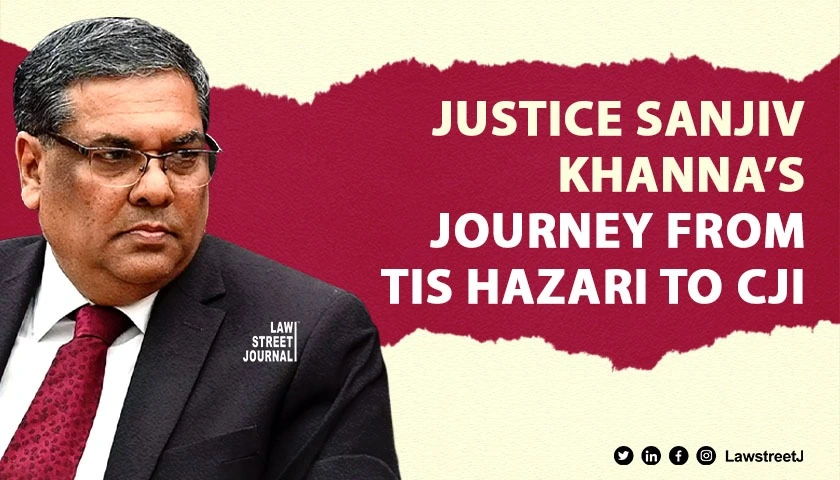New Delhi: Justice Sanjiv Khanna’s journey to the top of the Indian judiciary highlights his deep-rooted legal expertise, influential background, and significant contributions across various fields of law.
Justice Sanjiv Khanna has been officially appointed as the 51st Chief Justice of India (CJI) by the President of India, with his tenure set to begin on November 11, 2024. Justice Khanna will succeed the incumbent CJI, Dr. D.Y. Chandrachud, who will retire on November 10 after completing a two-year tenure. Justice Khanna’s term as CJI will last for a little over six months, ending on May 13, 2025.
Early Life and Legal Pedigree
Born on May 14, 1960, Justice Khanna comes from an influential legal family. His father, Justice Dev Raj Khanna, served as a judge at the Delhi High Court before retiring in 1985. His mother, Saroj Khanna, was a Hindi lecturer at Lady Shri Ram College in Delhi. Justice Khanna’s legal education began with his schooling at Delhi’s Modern School, which he completed in 1977, followed by graduation from St. Stephen’s College in 1980. He later pursued law at the Campus Law Centre, Delhi University, completing his legal studies at the Faculty of Law.
Justice Sanjiv Khanna’s Career
After enrolling with the Bar Council of Delhi in 1983, Justice Khanna began his legal practice at the Tis Hazari district courts. He later shifted to the Delhi High Court and tribunals, where he practiced in diverse areas of law, including constitutional law, commercial law, taxation, arbitration, land law, and environmental law.
His early career saw a significant boost in 2004 when he was appointed Standing Counsel (Civil) for the National Capital Territory of Delhi after serving as the Senior Standing Counsel for the Income Tax Department. The breakthrough in his judicial career came in 2005, when he was elevated as an additional judge of the Delhi High Court, followed by his appointment as a permanent judge in 2006.
Justice Khanna’s appointment to the Supreme Court of India came on January 18, 2019, marking a new chapter in his illustrious career. His selection to the apex court, however, was not without controversy. The Supreme Court’s collegium recommended his elevation, which was met with some criticism due to the exclusion of other senior judges, but his consistent contributions to the judiciary have since cemented his standing.
Justice Sanjiv Khanna’s appointment as CJI
Justice Khanna’s appointment as CJI follows the recommendation by the current CJI, Dr. D.Y. Chandrachud. In a formal letter to the Centre, CJI Chandrachud proposed Justice Khanna’s appointment as his successor, effective November 11, 2024, the day after his own retirement. The Union Law Minister, Arun Ram Meghwal, confirmed the appointment via a post on X (formerly Twitter), announcing that the President, after consultation with the CJI, had appointed Justice Khanna as the next Chief Justice of India.
Justice Sanjiv Khanna’s Judicial Contributions and Landmark Decisions
Throughout his career, Justice Khanna has been part of several landmark rulings. Notable among these was his dissent in the Central Vista project case, where he emphasized the importance of public participation in decision-making processes. He also played a key role in the Supreme Court’s decision to bring the office of the Chief Justice under the Right to Information Act, 2005. Justice Khanna has been a member of benches that decided critical issues, including the dilution of Article 370, electoral bonds, and marriage dissolution under Article 142 of the Constitution.
As CJI, Justice Khanna will be tasked with resolving several high-profile cases left by his predecessor, including the validity of marital rape exceptions, the restitution of conjugal rights, and crucial decisions related to the LGBTQI+ community’s marriage equality review.
Justice Khanna’s legacy will undoubtedly be shaped by his decisive rulings in these and many other matters, as he continues to influence the trajectory of Indian jurisprudence during his time at the helm of the judiciary.















